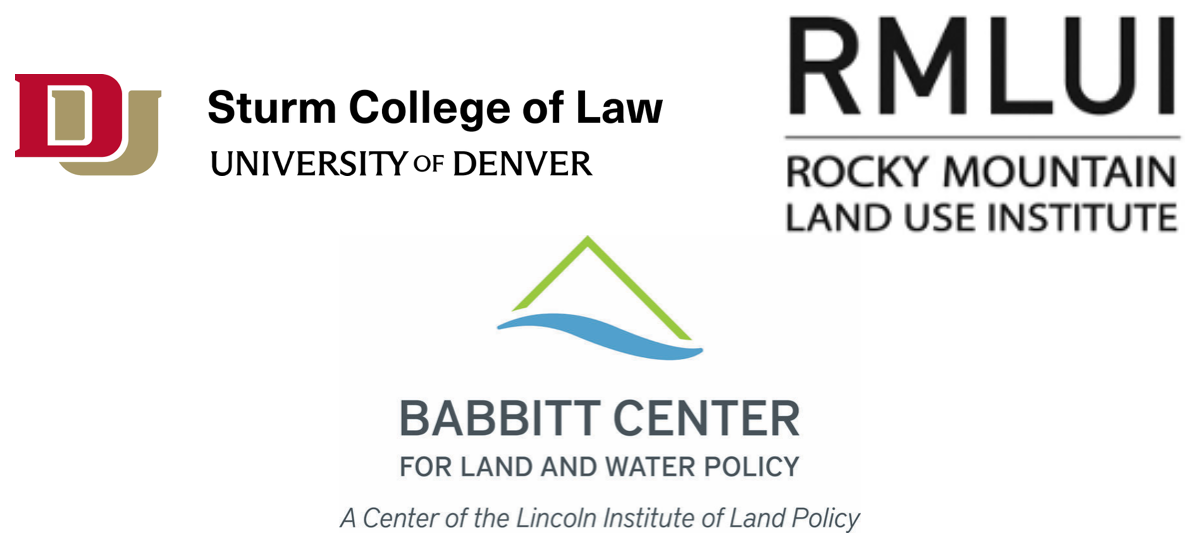Carver Colloquium
The Carver Colloquium is an annual event hosted by the Rocky Mountain Land Use Institute and Jan Laitos, the John A. Carver Jr. Chair at the University of Denver Sturm College of Law, and presented in partnership with the Lincoln Institute of Land Policy. Held each fall term, the Colloquium features two leading legal or planning scholars from the land use, environmental, and natural resources law fields. The Colloquium presents divergent or alternative viewpoints on cutting-edge issues in these fields in a point–counterpoint format.
The Carver Colloquium is presented by:

Past Colloquia
Carver Colloquium Archive
Expand items in the list below for information, videos, and materials from past Carver Colloquia.
-
9th Annual, 2020 – "The Rights of Nature: Should Bodies of Water Have Legal Rights?"
Friday, March 6, 2020
Should rivers, mountains, and streams be given the same legal rights as a person? Historically, nature has been viewed as public or private property, and decisions about its use is decided accordingly. Rights of Nature advocates argue that these laws don't go far enough to protect nature against human interests, and so should have legal rights of its own. Others argue that our existing laws and regulations provide adequate protection and that adding more would simply result in more red tape and cost taxpayers money.
This year's debate explored the ramifications of the Rights of Nature with guest speakers Laura Chartrand and Grant Wilson.
Speakers
Laura Chartrand
Founding Partner, Chartrand Law, LLCLaura L. Chartrand is founder of Chartrand Law and The Colorado Regulatory Reporter. Prior to opening her own firm, she served as Deputy Attorney General for the Colorado Attorney General's Office Natural Resources and Environment Section, directing the litigation and general counsel for agencies within the Department of Natural Resources and the environmental divisions of the Colorado Department of Public Health and Environment. She previously held legal and policy positions at the Western Governors' Association, Tri-State Generation and Transmission Association, Inc., and Holsinger Law, advising on critical natural resource issues including water resources and quality, the U.S. Forest Service Groundwater Directive, abandoned mines, grazing rights on public lands, R.S. 2477 matters, energy development, and endangered species. Ms. Chartrand obtained her J.D. at the University of Denver and B.A. at the State University of New York. She is admitted to practice in Colorado and the U.S. Court of Appeals, Tenth Circuit.

Grant Wilson
Executive Director & Directing Attorney, Earth Law CenterGrant Wilson is the Executive Director & Directing Attorney of leading Rights of Nature organization Earth Law Center. He is an expert in international law, environmental law, and ecological-based laws. Over the last fifteen years, he has fought for the health of rivers, forests, and other ecosystems across the world. He has helped write numerous laws recognizing nature as a subject of rights and is a lead editor of a law school casebook entitled Earth Law: Emerging Ecocentric Law. Prior to Earth Law Center, Mr. Wilson led environmental law and policy campaigns throughout the world — in Kenya, Hungary, and elsewhere. He earned a J.D. with a Certificate in Environmental and Natural Resources Law from Lewis & Clark Law School in Portland, Oregon.
Moderator
Jan Laitos
John A Carver Jr. Chair, University of Denver Sturm College of LawJan Laitos holds the John A. Carver Jr. Chair at the University of Denver Sturm College of Law. He is a Reporter for the Planning and Environmental Law Review, a regional board member of the Rocky Mountain Land Use Institute, and Trustee of the Rocky Mountain Mineral Law foundation. He was Vice Chair of the Colorado Water Quality Control Commission. In 1996, he was given the University of Denver's distinguished Teaching Award, and in 2005, he was selected a "DU Law Star." He has worked as a consultant on several cases decided by the 9th Circuit Court of Federal appeals, the Montana Supreme Court, the Nevada Supreme Court, the Idaho Supreme court, and the Colorado Supreme Court, and on several petitions before the United States Supreme Court.
-
8th Annual, 2018 – "The Role of NEPA: Does It Protect the Environment or Obstruct Progress?"
November 19, 2018
The National Environmental Protection Act (NEPA) was passed almost 50 years ago and was the first piece of national environmental legislation in the United States. Its purpose is "to foster action that protects, restores, and enhances our environment." Critics of NEPA say that its requirements are no longer needed in light of the numerous other federal, state, and local environmental regulations now in place. This year's Carver Colloquium featured a debate over whether or not NEPA should be repealed (or significantly limited), and featured Justin Pidot, Professor of Law at the University of Denver Sturm College of Law, and Sandi Zellmer, Professor of Law at the University of Montana's Alexander Blewett School of Law.
-
7th Annual, 2017 – "To Shrink or Not to Shrink? Presidential Authority Over National Monuments"
November 20, 2017
The American Antiquities Act of 1906 provides for the protection and preservation America's cultural and natural resources, enabling presidents to set aside areas to protect objects and landscapes with historic, scientific, and cultural significance through the designation of national monuments. The 2017 Carver Colloquium explores the ability of standing presidents to diminish or abolish national monuments created by past presidents.
Colloquium Materials -
6th Annual, 2016 – "Water for Sale: Prior Appropriation or Free Market Trade?"
September 29, 2016
Can Colorado's prior appropriation doctrine accommodate a free market system for water? And if it can, should it? The speakers from the 2016 Carver Colloquium address these questions, as well as whether water should be traded as a commodity in water markets, rural and urban equity, and how prior appropriation can protect environmental and recreational values.
Colloquium Materials -
5th Annual, 2015 – "State Control of Federal Lands: Legal or Not?"
October 6, 2015
Federal ownership of public lands has been a hotly debated topic in the West, long before the Sagebrush Rebellion of the 1970s and 80s first brought it national attention. Now the issue is back in the news — and in legislatures and courts — across the West. At the heart of the issue, however, is whether states have any legal claim to these lands. Despite several attempts to pass legislation in the past, the federal government has retained control. The 5th annual Carver Colloquium focused on whether current efforts to transfer control to the states can succeed.
-
4th Annual, 2014 – "Fracking Bans & Setbacks: An Unconstitutional Takings?"
October 14, 2014
A takings is the seizure of private property or a substantial deprivation of the right to its free use that is caused by government action. This year's event will debate the issue of whether or not proposed fracking bans and setbacks constitute a takings.
-
3rd Annual, 2013 – "The Colorado Compact: Effective or Obsolete?"
November 12, 2013
Negotiated almost a century ago, the Colorado River Compact allocates water supply among many of the western states, but it may be outdated. The Compact overestimated the amount of water available from the Colorado River, seeming to benefit Arizona, Nevada, and California at the expense of Upper Basin states like Colorado, and failed to anticipate current and future demands on the River that have been exacerbated by climate change. Is the Compact still relevant or should we throw it out and start over?
-
2nd Annual, 2013 – "Local Regulation of Oil & Gas Production"
January 24, 2013
The 2013 Carver Colloquium featured a debate between UCLA Professor Robert Freilich and Dan Domenico, the Colorado Solicitor General. The Colloquium focused on the challenges facing local governments regarding oil and gas drilling and production in their communities, in light of the traditionally dominant regulatory role played by state authorities, such as the Colorado Oil and Gas Commission.
-
Inaugural, 2012 – "The Governance of Renewable Energy Transmission"
The first Carver Colloquium featured former Colorado Governor Bill Ritter, Jr. and Robin Kundis Craig, Associate Dean of the Florida State University College of Law, who presented two models of governance to overcome this challenges of energy transmission.



